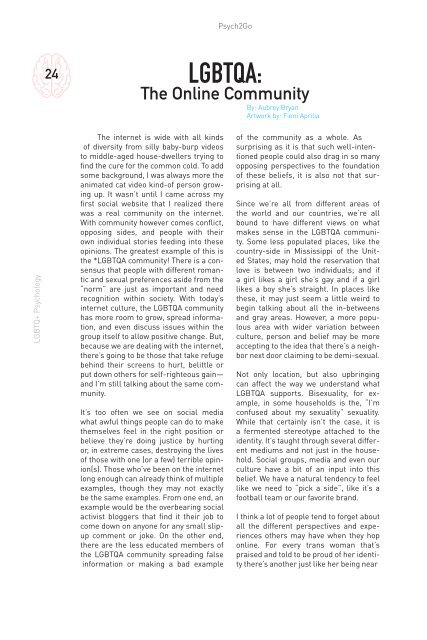PSYCH2GO-HQ-Pages
Create successful ePaper yourself
Turn your PDF publications into a flip-book with our unique Google optimized e-Paper software.
Psych2Go<br />
24<br />
LGBTQA:<br />
The Online Community<br />
By: Aubrey Bryan<br />
Artwork by: Fieni Aprilia<br />
LGBTQ+ Psychology<br />
The internet is wide with all kinds<br />
of diversity from silly baby-burp videos<br />
to middle-aged house-dwellers trying to<br />
find the cure for the common cold. To add<br />
some background, I was always more the<br />
animated cat video kind-of person growing<br />
up. It wasn’t until I came across my<br />
first social website that I realized there<br />
was a real community on the internet.<br />
With community however comes conflict,<br />
opposing sides, and people with their<br />
own individual stories feeding into these<br />
opinions. The greatest example of this is<br />
the *LGBTQA community! There is a consensus<br />
that people with different romantic<br />
and sexual preferences aside from the<br />
“norm” are just as important and need<br />
recognition within society. With today’s<br />
internet culture, the LGBTQA community<br />
has more room to grow, spread information,<br />
and even discuss issues within the<br />
group itself to allow positive change. But,<br />
because we are dealing with the internet,<br />
there’s going to be those that take refuge<br />
behind their screens to hurt, belittle or<br />
put down others for self-righteous gain—<br />
and I’m still talking about the same community.<br />
It’s too often we see on social media<br />
what awful things people can do to make<br />
themselves feel in the right position or<br />
believe they’re doing justice by hurting<br />
or, in extreme cases, destroying the lives<br />
of those with one (or a few) terrible opinion(s).<br />
Those who’ve been on the internet<br />
long enough can already think of multiple<br />
examples, though they may not exactly<br />
be the same examples. From one end, an<br />
example would be the overbearing social<br />
activist bloggers that find it their job to<br />
come down on anyone for any small slipup<br />
comment or joke. On the other end,<br />
there are the less educated members of<br />
the LGBTQA community spreading false<br />
information or making a bad example<br />
of the community as a whole. As<br />
surprising as it is that such well-intentioned<br />
people could also drag in so many<br />
opposing perspectives to the foundation<br />
of these beliefs, it is also not that surprising<br />
at all.<br />
Since we’re all from different areas of<br />
the world and our countries, we’re all<br />
bound to have different views on what<br />
makes sense in the LGBTQA community.<br />
Some less populated places, like the<br />
country-side in Mississippi of the United<br />
States, may hold the reservation that<br />
love is between two individuals; and if<br />
a girl likes a girl she’s gay and if a girl<br />
likes a boy she’s straight. In places like<br />
these, it may just seem a little weird to<br />
begin talking about all the in-betweens<br />
and gray areas. However, a more populous<br />
area with wider variation between<br />
culture, person and belief may be more<br />
accepting to the idea that there’s a neighbor<br />
next door claiming to be demi-sexual.<br />
Not only location, but also upbringing<br />
can affect the way we understand what<br />
LGBTQA supports. Bisexuality, for example,<br />
in some households is the, “I’m<br />
confused about my sexuality” sexuality.<br />
While that certainly isn’t the case, it is<br />
a fermented stereotype attached to the<br />
identity. It’s taught through several different<br />
mediums and not just in the household.<br />
Social groups, media and even our<br />
culture have a bit of an input into this<br />
belief. We have a natural tendency to feel<br />
like we need to “pick a side”, like it’s a<br />
football team or our favorite brand.<br />
I think a lot of people tend to forget about<br />
all the different perspectives and experiences<br />
others may have when they hop<br />
online. For every trans woman that’s<br />
praised and told to be proud of her identity<br />
there’s another just like her being near


